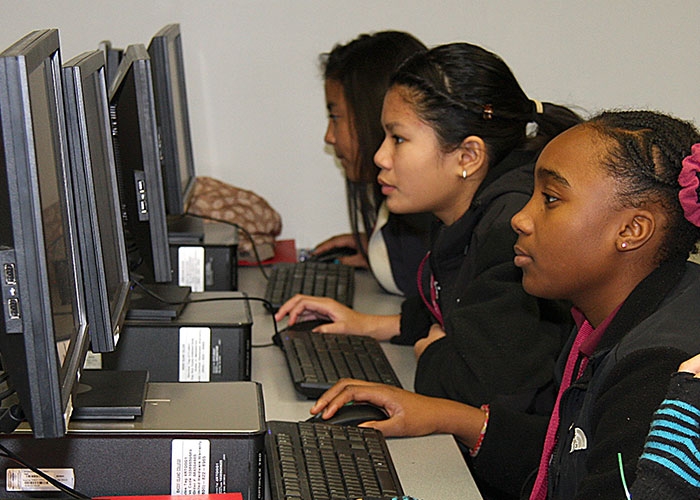RIC Prepares High School Students for Tech Career Paths
- News & Events
- News
- RIC Prepares High School Students for Tech Career Paths

If you are a high school student interested in studying computer science and/or cybersecurity, RIC offers a FREE GenCyber Camp as well as intro courses in the tech field that you can count for college credit.
“Over the past five years, Rhode Island College has been awarded over $400K in cybersecurity education grants sponsored by the National Security Agency and the National Science Foundation,” says RIC Associate Professor of Computer Science Suzanne Mello-Stark.
These grants fund GenCyber Camp at Rhode Island College – a FREE, fully online cybersecurity program for rising high school sophomores, juniors and seniors – along with many cybersecurity events for high school and college students throughout the academic year.
These grants also provide opportunities for RIC computer science students, who are hired as GenCyber teaching assistants to help mentor the campers.


This summer, 50 high school students from across the country (20 of which are from Rhode Island) will participate in GenCyber Camp 2023, which runs from June 19 to July 14.
Camp begins with fun, warm-up activities completed at the campers’ own pace (June 19-July 7). And then from July 10-14, from 8:30 a.m. to 3:30 p.m., students begin learning computer programming and the soft skills they’ll need in the tech industry, such as learning to think outside the box, problem solving and critical thinking.
A camp favorite is Capture the Flag, says Mello-Stark. Created by HacktheBox and sponsored by OSHEAN, this version of Capture the Flag is a gamified learning platform where students are given problems to solve, such as networking and cryptography. When they solve a problem, they get a flag.
“They’re basically competing against each other to get the most flags,” Mello-Stark says. “The kids love it.”
Awards and prizes will be earned throughout the week, and at the end of camp, participants receive a certificate of completion.
Mello-Stark says, “Many of the students who attend camp go on to pursue post-secondary education in cybersecurity, while all of the RIC students who worked as TAs in the camp are now pursuing careers in cybersecurity. In just five years, GenCyber has created a vibrant cybersecurity community among high school and college students in Rhode Island and beyond.”
To keep the learning going, Mello-Stark has organized additional cybersecurity activities for program participants throughout the fall and winter, such as workshops in RIC’s computer science lab and movie nights featuring cybersecurity films and lots of popcorn.

Learning is also going on in the classroom. The Department of Computer Science and Information Systems is opening up for the first time two college-level courses to high school students for college credit.
During Summer Session II (June 26-Aug. 4), the course CIS 252: Introduction to Information Systems will have seats reserved for high schoolers.
And in the Fall Semester, the same course will be offered, along with CSCI 102: Computer Fundamentals for Cyber Security, with spots open for teens. Both courses are online and asynchronous.
These special offerings were initiated by RIC Professor of Computer Information Systems Lisa Bain, who is also director of the Rhode Island STEAM Center at RIC. Bain has been working tirelessly with Mello-Stark to create pathways for high school students into IT careers and to encourage them to come to RIC to launch their careers.
“I particularly want high school students to be aware of the different types of careers in IT that are out there,” Bain says. “Computer science used to be just programming. That was your education and that was your job. But there’s so many different career opportunities now. You can go into cybersecurity, tech support, data analytics, Web design and development, artificial intelligence and so much more.”

As director of the Rhode Island STEAM Center, the state’s primary educational hub for increasing STEAM literacy in Rhode Island, Bain recently invited to campus 50 Central Falls High School and Johnston High School students who were taking computer science classes at their respective high schools.
At RIC, they sat in on a college-level computer science course, they went on a campus tour and they ended their half-day visit with lunch at Donovan Dining Center.
“Some of these students had never stepped foot on a college campus before,” Bain says. “It opened their eyes to Rhode Island College and what we have to offer.
“Even more, they were able to sit in on a computer science class and answer the professor’s questions when they were called on. It showed them that they can do this work.
“These are students who may never have considered going to college or pursuing a career in technology. Now they are. At RIC, we’re assisting in their upward mobility and we’re helping the State of Rhode Island because these are students who will most likely continue to live in Rhode Island. I couldn’t be more proud of these students.”


